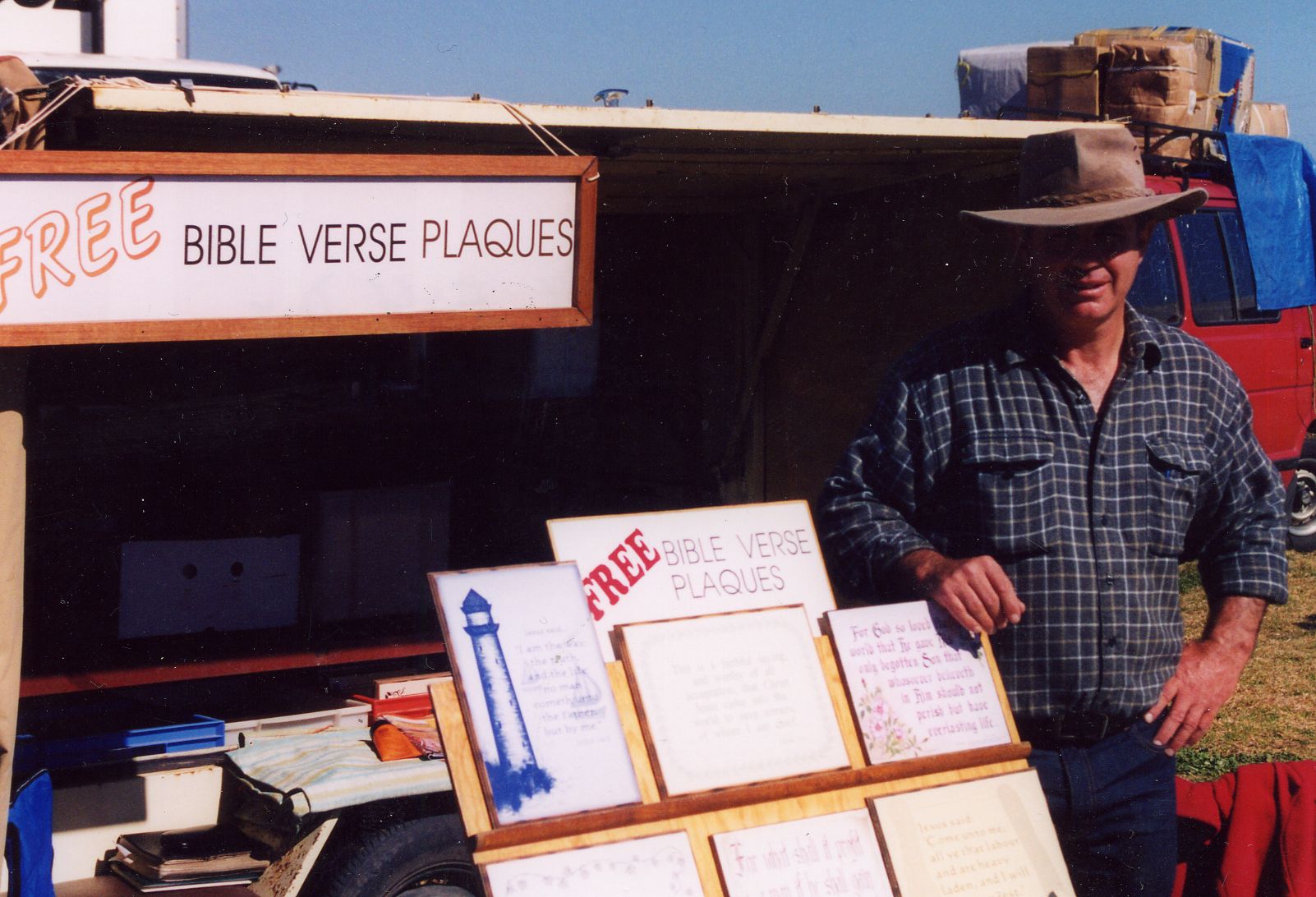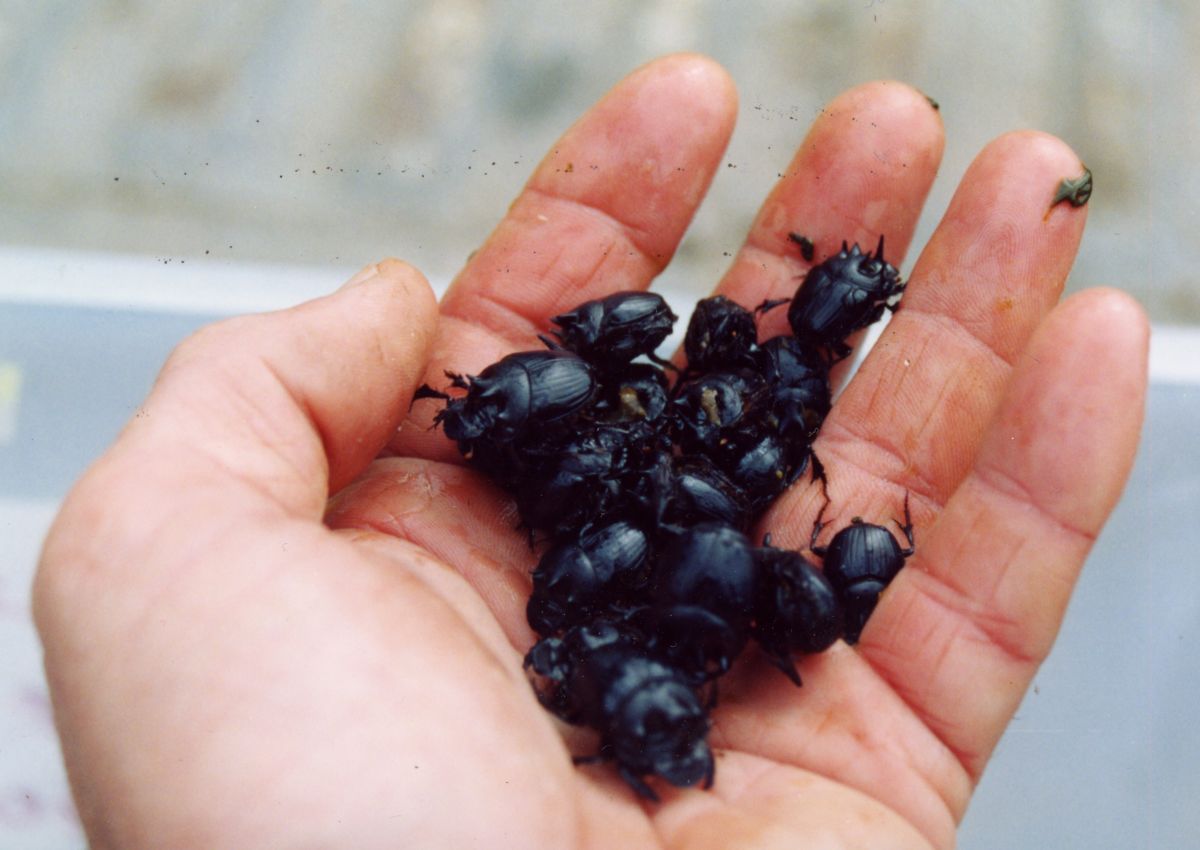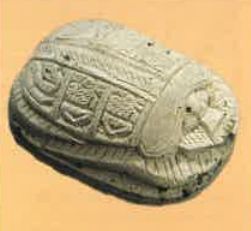Caring for creation
An interview with environmental consultant Greg Dalton

Greg Dalton left home at 16 years of age in unhappy circumstances. As Greg recounts, ‘For a few years I was “stoned on drugs” nearly every day. I travelled around eastern Australia, living in communal houses, “living it up” at beaches and parties and generally avoiding the law. Occasionally, I got labouring jobs, but I also made quite a bit of money drug dealing.’
Working in the forests of southern Tasmania, he got off the drugs for a while and the mental fog cleared a bit. Greg recalls, ‘I became awed with the beauty surrounding me; the mountains, the forests, the snow on the ferns. Looking up at the stars; they seemed so incredible to me that I thought there must be a greater force behind all this.’ This was the first time he recalls thinking that there must be a Creator—creation demands a Creator (Romans 1:20; Psalm 19:1).
Back in the city, in a communal house, he got back onto the drugs. But he picked up a New Testament one day and began reading: ‘After reading only a few chapters it impressed me with how “This book is about me”. It looked into my heart and showed me my thoughts and feelings. It understood my sorrows; it was wisdom and it revealed my sin before God.’
‘Love your neighbour and love your enemies’ (Matthew 5:43–44) convicted Greg of his sin. He gave up drug dealing and got a job. ‘I felt wrong even using drugs but did not give them up just yet’, Greg related.
Greg struggled with an increasing sense of his sinfulness and his lost condition before God, almost to the point of despair. Finally, at an agricultural show in a country town, he saw a tent where they were giving away framed Bible verses. The people were there to give, not take, which impressed Greg, and he went in. Greg recounts, ‘An elderly gentleman opened a Bible and we read together how we have all sinned and the Lord Jesus died on the Cross to pay for all our sin. I remember relating to Isaiah 53:6: “All we like sheep have gone astray; we have turned everyone to his own way; and the Lord has laid on Him the iniquity of us all.” I knew I had gone astray, and as the Scriptures were read to me, the tears flowed as the love of God was made real to my soul. I saw clearly that Christ had died for my sin. That day I was born again as I trusted Him to save me. And not only that, God has given me a peace and satisfaction. The Lord Jesus spoke to me when He said, “My peace I give unto you: not as the world gives, give I unto you”’ (John 14:27).
As God put Greg’s life together, he enrolled at Queensland Agricultural College and graduated with a B.App.Sc. in horticultural technology.
Greg worked for 13 years with the South Australian government, mainly in revegetation (reforestation), encouraging farmers to plant trees to improve the farm environment.1 Greg managed the government’s revegetation research projects and has written many papers and two books on trees. He now runs a business advising farmers on all aspects of land care management. He calls his business Creation Care, the name reflecting Greg’s conviction that this is God’s world and that we are commanded to care for it—that the commission given to Adam in Genesis 1:26 has never been revoked. Greg says, ‘Our name plays on the word “Landcare” but takes it further in that we believe we should be caring for creation, not just the “land”. By creation, we mean caring for all God’s created beings, including fellow humans. Hence, we see our business as a ministry and opportunity to care for people as well as natural resources.’
‘Green’ Greg?
I put it to Greg that his approach contrasts with the ‘green’ movement that sees people as the problem. Greg commented, ‘People are part of the problem in that greed causes much abuse of natural resources. People would care for the natural resources much better if they knew the Lord; that is, if they were spiritually restored to God and therefore did not want so much money. I see people, all of us sinners, as part of the problem. But I see the real solution as restoration to our Creator.’
Unlike many ‘greens’, Greg also recognizes that the creation is ‘fallen’—groaning because of the effects of sin, beginning with Adam (Genesis 3, Romans 8:22). Greg explained, ‘I do not see nature as sinful but as affected and suffering because of the sin of man. Man abuses nature in lusting for power and wealth.’ I asked Greg if he sees the world before the sin of Adam and Eve as being perfect, with no death and suffering at all, even of sentient animals? Greg responded, ‘Yes, definitely … “As by one man sin entered into the world and death by sin”’ (Romans 5:12, Romans 8, etc.).
The Bible special

Greg came to Christ through the Bible, so he holds the Bible in very high regard. He and his family (he is married with four children) produce beautiful block-mounted Bible verses that they give away at agricultural shows and street stalls around South Australia—around 3,000 verses each year. Greg commented, ‘The more I go on as a Christian, the stronger I feel that believing the Word of God is the single most important thing I should do.’ He regards the Bible to be without error. The Bible says God created in six days, ‘so that’s how it must have been—I trust the Bible’, says Greg.
I asked Greg how the teaching of evolution at school and university had impacted him. Greg: ‘I don’t recall thinking about God until I was about 19. I was just caught up in music and drugs. I had no time at all for God. In fact, when I first began to think about God, I found it incredible to think that I was becoming “religious”—I was the last person (I thought) who would be religious! If you had asked me whether I believed in evolution or creation I would have said something like, “Don’t know and don’t care.” I suppose I did not really believe there was a God because I did not want to see myself as accountable to anyone, so the evolution lie had worked on me!
‘Despite what I might have been taught about evolution, it was the wonders of creation that first made me realize there was a God. As I went through college as a Christian, although taught evolution, I believed God was real and that even if I could not explain all the scientific arguments, there would be explanations that hopefully I would find one day. I did find them one day—in your literature.’
Ecology and creation
Greg’s study of ecology has reinforced for him the importance of God creating everything in six days. His work with dung beetles underlines this.
‘Animals produce dung. Certain flies, such as the Australian native bush fly, breed in dung. And dung can also harbour diseases. However, when the correct dung beetles are present, they bury the dung, and problems with flies and disease virtually disappear. Furthermore, in burying the dung, dung beetles fertilize, or manure, the land. This helps the growth of pastures, which then benefits the cattle, sheep, etc., and the farmers! It also means that farmers can use much less of the fertilizers that acidify the soil and add to pollution of watercourses. Dung beetles also tunnel into the soil, providing channels for water infiltration. This reduces water runoff and soil erosion and increases the amount of water in the soil for pasture growth. Dung beetles transform a pollutant into an environmental and agricultural benefit!’

Cattle came to Australia on the First Fleet in 1788. However, the settlers did not bring the types of dung beetles that could handle cow dung. As cattle farming spread over the country, the bush flies multiplied. The plague of flies in the warmer months just about drove everyone nuts.
All sorts of devices were invented to deal with them. The famous ‘Australian salute’ (waving the flies out of your eyes) and hats with corks dangling from the brim came from this fly menace. The flies also spread diseases like eye infections in people and animals.
Then scientists learned about dung beetles. The ones that can deal with cow dung were absent from Australia. We had ones that handled kangaroo and wombat droppings, but not the cow stuff. Introduction of beetles for cow dung has resulted in a wonderful transformation of outdoor life in Australia. The ‘Australian salute’ is all but dead in much of southern Australia. You can even have a barbecue outside in the middle of summer where once it was unthinkable because of the flies.
And that’s not all. Greg told of research that shows that the humble dung beetles can stop contamination of water supplies with microbes carried by animal faeces. Greg relates, ‘In Milwaukee, USA, in 1993, a Cryptosporidium outbreak caused by contaminated drinking water induced diarrhoea in over 400,000 citizens, killed a few and hospitalized many. In an experiment done in Adelaide, South Australia, in 2003, by a colleague, Dr Bernard Doube, dung beetles removed over 99% of Cryptosporidium spores from a contaminated dung pad on the soil surface.’

So I asked Greg if dung beetles would have been in the Garden of Eden. ‘Of course’, he replied. ‘They would have ensured a healthy, safe environment for Adam and Eve and all God’s creatures. Indeed, this is why I believe that everything must have been created in a very short timeframe—six days—like the Bible says. Ecological systems demand that all the components be present from the start, otherwise it just does not work! Dung beetles cannot exist without the animals to produce the dung. And the animals rely on the dung beetles to bury the dung to keep microbes from causing disease and to fertilize the soil so that lots of grass will grow to feed the animals. They depend on each other.’2
Greg sees no sense in the idea of a ‘stretched-out’ development of life—evolutionary or otherwise: ‘Trying to explain creation as God driving a process of natural selection over eons of time does not stand up because creatures would not survive as they waited (for example) for their reproduction organs and functions to develop! And creatures and plants depend on complete ecosystems. Each kind must have been created, fully functional, in an instant. God said it, and it was so’ (Genesis 1:7, 11, 15, etc.).
I asked Greg about mutations and natural selection, which many mistakenly think is the same as evolution. Greg said, ‘Selection, whether it be natural or by man, results in loss of genetic information—breeding discards genes for crooked trunks or low wood production in forestry trees. So selection causes a reduction in the genetic information in the gene pool. In natural selection, if dark moths are “selected” naturally and light moths die out, then we have a reduction in the genetic information as to the colour of moths. The theory of evolution needs increases in genetic information, but selection (natural or man-induced) results in reduction of genetic information. If evolution were true, then the microbe from which we are all supposed to have evolved must have had an incredibly complex gene pool as it would have to have contained all the genes of every subsequent species, from which all species have evolved by natural selection as the gene pool is reduced. This doesn’t make sense because a living organism with that degree of genetic complexity would hardly be a microbe! Couple this with the fact that mutations cannot create complex genes for new functions (needing new information) and are usually detrimental to the survival or features of an organism, and then the whole argument of evolution doesn’t stand up. Creation makes much more sense.
‘But of course if things were created, then there is a Creator and we are accountable! It was the wonder of creation that made me realize there was a God and that I was accountable to God. This led me to seek righteousness, but I soon found out I was a sinner and could not be righteous before God by myself. This led me to see and find salvation in Jesus Christ. I now know God as not only Creator, but as my Saviour!’
Thanks, Greg.
Ancient Egyptian connection

The ancient Egyptians portrayed the dung beetle (known as the Scarab, right) in artwork, amulets and other jewellery. They believed scarabs spontaneously generated from the tiny burrows in which they hatched. Egyptians worshipped them under the name Khepri, meaning ‘He who comes forth’. They are among the more popular and obvious of relics from ancient Egyptian culture, and given status in some movies and modern-day jewellery.
Today, Christians like Greg Dalton (who researches the wonderfully beneficial effects of such insects) understand and teach that God the Creator made the dung beetle to share a special place and function on the earth.
Notes
- Farmers in the past tended to remove too many trees, thinking that the increase in land available for cropping or pasture would increase their profits. However, removal of so many trees often resulted in rising water tables and salting of land, ruining it. Also, trees can actually increase the productivity of crops and animals by providing wind shelter and shade (for animals). Return to text
- There must have been fairly rapid reformation of ecosystems after the Flood. See Swenson, K. and Catchpoole, D., After devastation … the recovery, Creation 22(2):33–37, 2000. Return to text


Readers’ comments
Comments are automatically closed 14 days after publication.